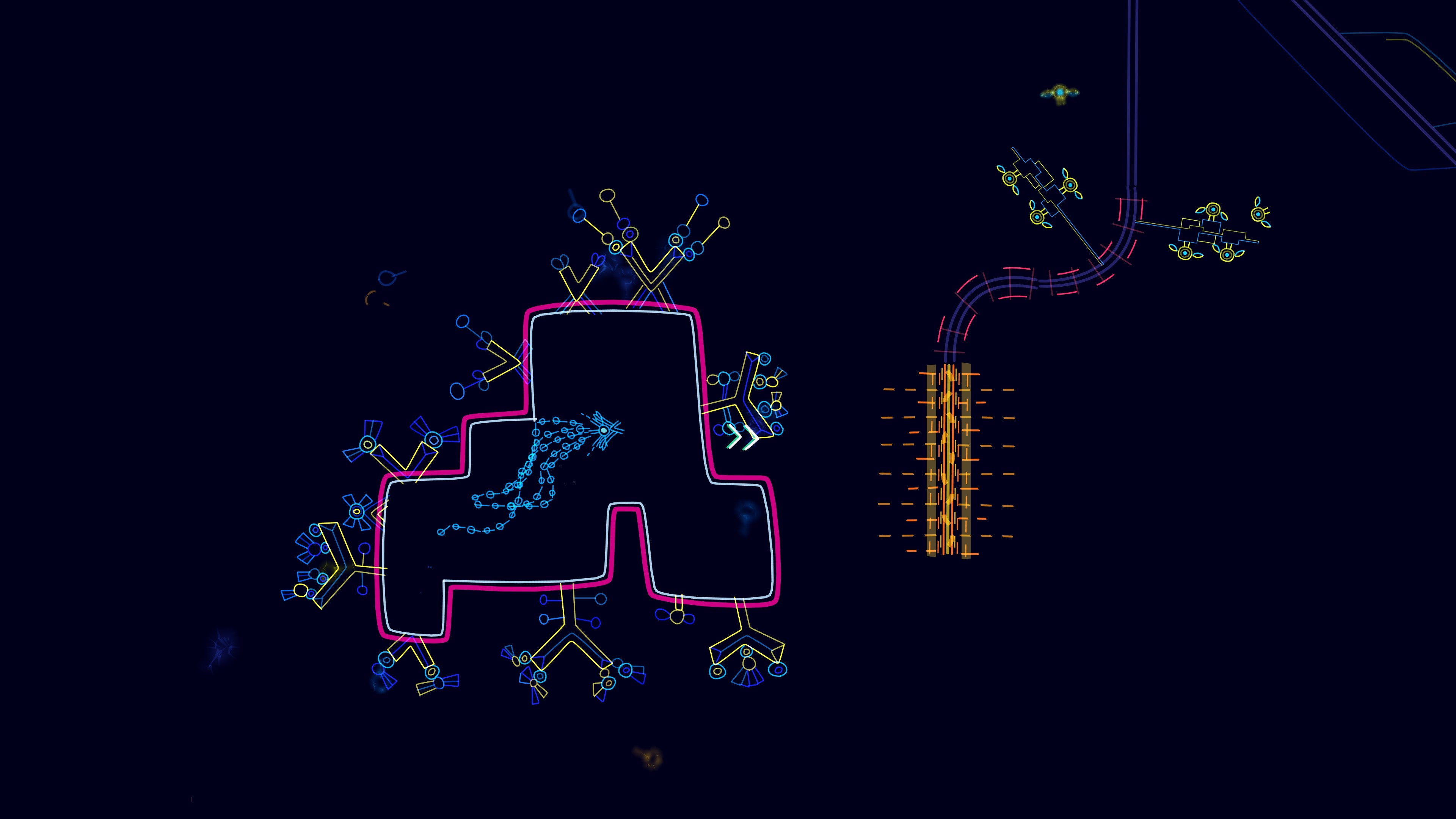Instead of jumping between these strange, cell-like shapes, you must simply propel yourself forward, flinging yourself across the gaps with nothing but the momentum of your long, snakey body. Eventually you’ll learn to dash, giving you the ability to launch yourself in any direction you please and cross even larger gaps and obstacles, but that’s pretty much the extent of your own abilities. Rather, this is a game about using what’s in front of you to carve a path through the world’s amorphous structures, bouncing yourself off blue barriers, weaving through red fences, zipping to different locations using strange, wirey trains, and, occasionally, getting your pals to uncover hidden, invisible routes whose shapes have an uncanny resemblance to the shape of a lemon. While small in number, Ynglet’s eight worlds grow and evolve with satisfying complexity, with each one adding new kinks and wrinkles until they’re all layered up into the most delicious of microbial sandwiches. There’s a real sense of playfulness here, from the bursts of colour that light up the screen when you slide across new shape clusters to the reactive sound system that crackles and froths with gleeful little plinks and ploops as you scuttle toward the goal. Moving in Ynglet is at once both tight and loose, its freefall floating sitting in sharp relief to its fast, angular dashes. But it’s that very combination that makes Ynglet feel so exuberant under the thumbs, like you’re channeling some wild, untameable force that’s just on the verge of being broken in, but always manages to give you a cheeky wink and slip through your fingers at the last second. Guiding and funnelling your little amoeba lizard from A to B and seeing what weird, doodled delights await you on the next screen is all part of the fun, but where Ynglet really comes alive is when you wander off the beaten track to hunt down its collectible stars. These additional abstract challenges all have the same objective - to chuck yourself at five glowing orbs without touching any of the regular squares around them to reveal the final treasure - but they revel in getting you to twist and turn in ways you’re simply not asked to on the main path. They’re fun mini morsels to gobble up before rejoining the rest of the level, rewarding your physical dexterity with even lovelier visual flourishes than what you see elsewhere. Best of all, Ynglet rarely falls into that platformer pitfall of trial and error. Before you begin each level proper, you must complete a mini tutorial room that lets you practice the next world’s key traversal challenge. Whereas before you might simply have bounced off those blue barriers, say, now you must learn to dash through them as well. Naturally, Ynglet is best played with a controller (only a masochist would try this with a mouse and keyboard), but even on its highest ‘Challenging’ difficulty level, it never felt like it was asking too much of me. After all, when you can create an instant respawn point pretty much anywhere on the map simply by ‘resting’ a while in any regular square, missing a jump and falling to your doom rarely becomes a source of frustration. (Unless, cough, you keep forgetting to rest somewhere sensible because you’re so gosh darn overconfident in your own abilities that you end up spawning much further back than you were before, of course. That came back to bite me in the arse a couple of times, but only because I was so caught up in the flow of floating from one shape to another that stopping didn’t even enter the equation a lot of the time). Instead, the real challenge comes after the credits, where Ynglet gives you an extra handful of bonus levels that stretch its already abstract platforming apparatus to the extreme. These are properly hard, and there were moments when I stared at the vast chasms in front of me and wondered, “How in the heck am I getting to the other side?” Ultimately, though, Ynglet’s sparse toolset is exactly what makes it so elegant, and the sheer number of ways it’s put to use in these bonus rounds is truly impressive. When you’re confronted with an empty space and know instinctively what’s being asked of you, you know you’re onto a winner. All that’s left to do is cajole your fingers into following that mental mindmap you’ve laid out. And let’s face it, at little more than a fiver, there’s simply no excuse not to give Ynglet a go. It’s 90 minutes of pure, unbridled joy (more, if you attempt the bonus levels), and it’s unlike anything else I’ve ever played. It’s a bold, fun riot of colour and sound, and I only wish there was more of it.

